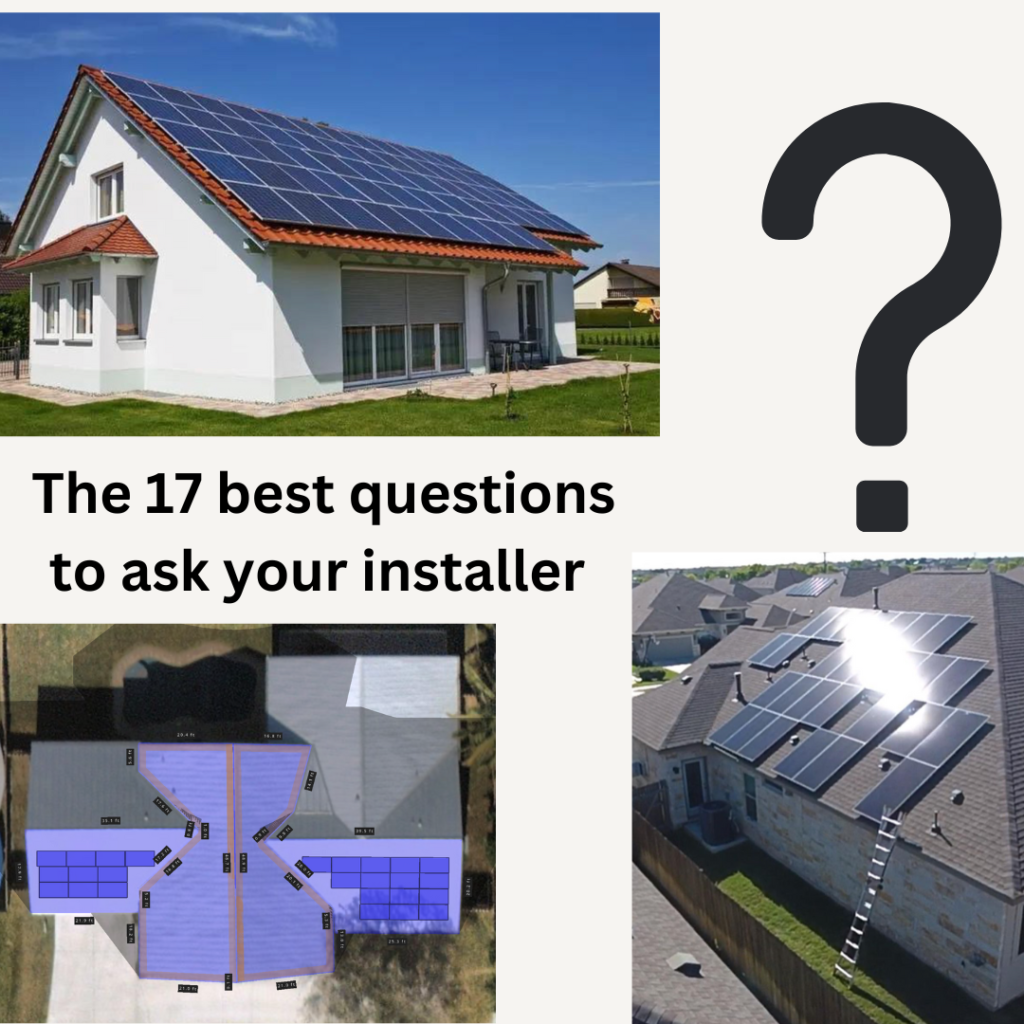Solar salesmen have no base salary, they make a living purely based on the commission obtained from closing a deal, which may be around 15% of the sale. The incentives for selling are so powerful that many of them are willing to skew the truth to lure you into buying the system. This guide was strategically made by industry insiders to help you investigate whether or not your solar salesman is honest and evaluate the competitiveness of the solar company they work for.
Questions to ask your solar installer:
Table of content:
- How long has the company been in business for?
- Test question: My roof is 25 years old. Should I install solar?
- Does the company subcontract any service? If so, which ones?
- Do you have your own professional engineers (PE’s) on-staff in-house?
- Are your crews fully insured under workman’s compensation?
- What licenses does your company hold?
- Can you provide me with the number of each license that you hold?
- What warranties do you offer?
- What are the expected fees I’ll have to pay?
- Who designed the system of my proposal, was it checked by any engineer?
- Do you hold an inventory of inverters for replacement only (not for sale) in case mine fails?
- How long does your average full installation take?
- Have you worked with my building department or AHJ before?
- How does the inspection procedure work? Will I have to be present?
- How does the payment timeline look?
- Do you offer any energy production guarantees?
- Will I have energy during a power outage?

1. How long has the company been in business for?
Avoid new companies. Unfortunately, a lot of 1-2 year old companies will very likely go out of business within the next 1-2 years. Many of these newly formed companies will over-promise and underdeliver which eventually puts them out of business. If your solar company goes out of business you will lose workmanship’s warranty, which is a very big deal.
2. Test question: My roof is 25 years old. Should I install solar?
Their answer should be “No”. Any other answer should be considered a red flag. Some salesman will persuade you and affirm that if your roof hasn’t had any water leaks it should be ok. This is not true, a tile/shingle roof should last 25 years. If your roof is 25 years old there is a high chance that it will not tolerate tenths of penetrations and that you will get water leaks within the following 10 years specially if you get solar panels installed. And the big issue is that an uninstall/reinstall of panels for re-roofing purposes can be very expensive (as expensive as the initial installation!). Therefore, if the installer insists on you getting panels even when your roof is that old, you should take that as a red flag.
With that being said, if your roof is old you may consider tearing off your current roof and installing the tesla solar roof
3. Does the company subcontract any service? If so, which ones?
Many solar companies are actually “marketing” companies. They get you as the lead/client and then subcontract every aspect of the installation process. In other words, the solar company may just be “the middleman” between you and the actual installers. While this is not illegal, it may lead to installation quality issues because the installers know that what’s in jeopardy is the reputation of the company they got subcontracted by (the marketing or face company) rather than theirs. Worse yet, these marketing companies may easily go out of business, in which case, you will lose any warranty you may have got with them.
4. Do you have your own professional engineers (PE’s) on-staff in-house?
Having professional engineers in-house shows that the company is “engineering oriented”, which gives a lot of validity to get high-quality installations. Otherwise, the company would have to subcontract a PE which may lead to delays, quality installation issues or a simple disconnect between engineering plans and actual installation.
5. Are your crews fully insured under workman’s compensation?
It is important that the employees that will be working on your roof are fully insured. If they are not and one gets injured on your property, you will likely be liable and may have to pay expensive medical bills or lawyers in case of injury.
6. What licenses does your company hold?
Depending on the location, a solar installation company may require different licenses. Ideally, all licenses are held in-house. Holding licenses such as: solar,electrical and roofing licenses shows that the company has qualified employees with experience.
7. Can you provide me with the number of each license that you hold?
You can look up any license and the owner online, depending on what state you are located in it will be on a different web site. If the license is under the name of a full-time employee or CEO that’s a good sign.
8. What warranties do you offer?
Warranties lengths determine how long the solar installer is willing to stand behind their installation. The higher the quality the longer they will be willing to stand behind it. The standard is to have 3 types of warranties as follows:
- 25 years wokmanship’s warranty
- 25 years roof penetration warranty
- 25 year equipment warranty by the equipment manufacturer.
9. What are the expected fees I’ll have to pay?
Some of these fees may include interconnection fees with the utility company or AHJ (building department) additional expense. Ask if the proposal price includes these fees.
10. Who designed the system of my proposal, was it checked by any engineer?
As I explain in this blog, salesmen have a tendency to not honor roofing codes. When it comes to their solar panel system design they may “overload” your roof with panels such that their commission is larger. When this occurs, you will get a system reduction later when your project gets to the engineering stage, at which point, you already have signed the contract. This often leads to slight delays and a reduction in the originally promised energy production.
11. Do you hold an inventory of inverters for replacement only (not for sale) in case mine fails?
Some solar contractors don’t have “ready to go” inverters in case yours fail, instead, they depend on the manufacturer which in some cases may take weeks or even months for them to ship you the replacement inverter. While your inverter is down, your solar system will not work and your return on investment will extend.
12. How long does your average full installation take?
Be careful with their answer, solar salesmen have a tendency to over-promise and may easily be deceiving by promising their installs take weeks when in reality it may take months. By reading company reviews you may get a more honest timeline for their installation turn-around times.
13. Have you worked with my building department or AHJ before?
AHJ refers to “Authority having jurisdiction”. Many cities in the US may have tenths or hundreds of these offices that enforce building codes. There is generally a great deal of communication between the project manager of the solar company and AHJ, hence relationships may be built. An AHJ that already knows the company and a company that already knows the AHJ is often a good sign that the project management process will go smoother than otherwise a company that does not know the “quirks” of that specific AHJ.
14. How does the inspection procedure work? Will I have to be present?
Sometimes, an inspection may take the whole day. It is not the actual inspection that takes this long, but rather the fact that the timing at which the inspector comes is often unknown and therefore, someone from the installation company is sent to sit in their car the whole day waiting for the inspector such that when he/she arrives the employee has the opportunity to show the plans and greet the inspector (i.e extent the ladder to the roof, open electrical boxes, etc). If the inspection fails this process may repeat itself and it can be annoying for the homeowner.
15. How does the payment timeline look?
Some solar companies may have a 10%, 25%, 25% and 40% model, others a 25%, 25%, 25%, 25%. The way this works is that you will pay 10% upon contract signing, you’ll pay 25% upon engineering completion, another 25% upon delivery of materials and another 40% upon utility interconnection. Make sure you understand the exact standards of completion such that you pay once the stage is really completed.
16. Do you offer any energy production guarantees?
This is usually not the standard. However, if your roof is heavily shaded, the solar contractor should recommend you to perform or pay for a “solar survey” in which a drone renders your roof in 3D and the shading objects around (such as trees) and then it performs “shade analysis”. They will then use software to model the annual energy production. This software such as https://scanifly.com/ is usually accurate and should be trusted.
17. Will I have energy during a power outage?
If you have an Enphase system you will get sun-ligh back-up with which you will have a limited amount of energy during the day. If you have SolarEdge or any other inverter without storage you will not have energy during a blackout; more about solaredge VS Enphase in this blog. If it is not an Enphase system the only way for you to have energy is by installing a storage system such as Tesla powerwalls or SolarEdge Energy bank.


Pingback: Cost of going solar: Are solar panels worth the investment? - Solar Examine
Pingback: 9 reasons why you should not go solar - Solar Examine